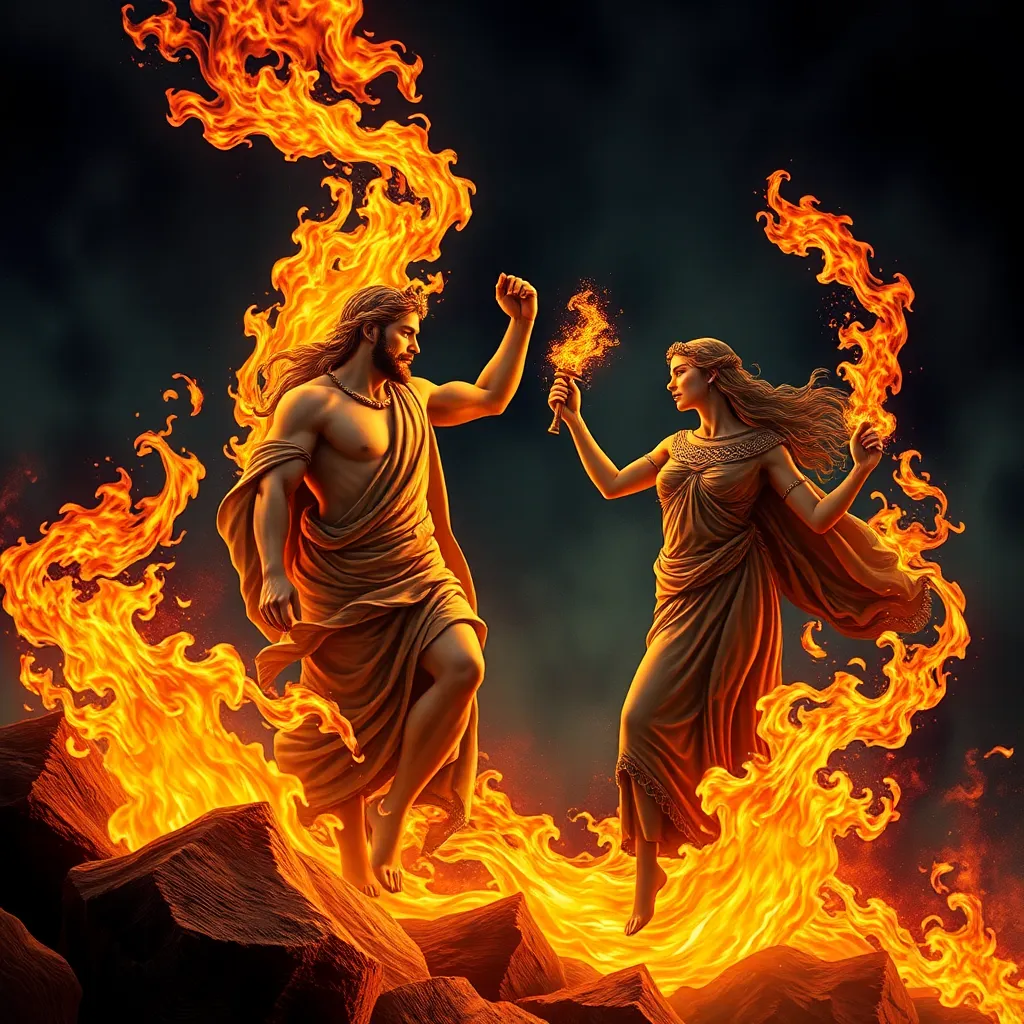The Symbolism of Fire in Jason and Medea’s Myth
I. Introduction
The myth of Jason and Medea is one of the most enduring tales from Greek mythology, showcasing themes of love, betrayal, and revenge. At the heart of this myth lies the powerful symbolism of fire, which serves as a recurring motif throughout the narrative. Fire not only represents transformation and passion but also embodies destruction and purification. This article aims to explore the multifaceted symbolism of fire in the context of Jason and Medea’s story, highlighting its significance in shaping their destinies and the events that unfold.
II. Fire as a Catalyst for Change
Fire plays a crucial role in instigating change within the myth of Jason and Medea. It acts as a transformative force that alters the characters’ lives and the course of events. The nature of fire is dual; it can be both destructive and creative, symbolizing the potential for rebirth as well as the end of something.
- Transformation of Medea: Medea’s initial use of fire to help Jason secure the Golden Fleece illustrates its creative aspect. Her magical abilities, fueled by fire, enable her to assist Jason in overcoming formidable challenges.
- Destruction of Relationships: As their relationship deteriorates, fire also represents the destructive force that leads to their tragic end, illustrating how passion can turn to rage.
This duality of fire serves as a reminder of its power to instigate both positive and negative changes in the lives of the characters, reflecting the complexities of human emotions.
III. Fire and Passion
An essential connection exists between fire and emotional intensity, particularly in the relationship between Jason and Medea. Medea’s love for Jason is depicted as a burning flame, characterized by fervor and loyalty. However, this passion is not without its consequences.
- Medea’s Fiery Love: Her overwhelming feelings for Jason drive her to commit acts that defy societal norms, including betrayal of her own family.
- Consequences of Passion: The intensity of Medea’s emotions ultimately leads her to drastic actions, culminating in a fiery revenge that decimates everything she once held dear.
This exploration of passion through the lens of fire reveals how deeply intertwined love and destruction can be, showcasing the volatile nature of human relationships.
IV. Fire as a Symbol of Betrayal
The imagery of fire emerges powerfully in the context of betrayal within the myth. Jason’s abandonment of Medea marks a pivotal moment that ignites her wrath and sets the stage for her revenge.
- Jason’s Betrayal: When Jason chooses to marry Glauce, the daughter of King Creon, he extinguishes the flame of their love, leaving Medea feeling scorched and abandoned.
- Medea’s Fiery Revenge: In response to Jason’s betrayal, Medea unleashes a torrent of fire through her vengeful actions, including the murder of Glauce and Creon, symbolizing the destructive force of her grief and anger.
This association of fire with betrayal emphasizes the emotional devastation that follows disloyalty, illustrating how betrayal can ignite a firestorm of consequences.
V. The Purifying Nature of Fire
In many ancient myths, fire is often depicted as a means of purification, cleansing characters of their pasts and allowing for rebirth. In Jason and Medea’s story, fire serves this purifying function in several ways.
- Purification of Medea: After committing horrific acts of violence, Medea’s use of fire symbolizes a cleansing process, as she seeks to rid herself of her former identity and the pain associated with her betrayal.
- Rebirth through Fire: The idea of rebirth through fire is prevalent in Medea’s transformation from a scorned lover to a powerful figure, asserting her autonomy and redefining her existence.
This concept of purification through fire highlights the potential for renewal, suggesting that even in destruction, there lies the possibility for a new beginning.
VI. Fire and the Divine
Fire also holds significant implications in the context of the divine within Greek mythology. The relationship between fire and the gods is often intertwined, with instances where divine fire influences the actions of mortals.
- Divine Fire: In the myth, Medea’s powers are often linked to the divine, as her abilities are said to stem from her heritage as a granddaughter of the sun god Helios.
- Divine Intervention: Fire acts as a representation of divine will, seen in moments when the gods intervene in mortal affairs, often using fire as a tool for their purposes.
This connection between fire and the divine emphasizes the belief that human actions are often guided by higher powers and reflects the reverence ancient Greeks held for the gods.
VII. Cultural Interpretations of Fire
Throughout ancient Greece, fire symbolized various cultural values and beliefs. The interpretations of fire within the myth of Jason and Medea must be understood against the historical backdrop of Greek society.
- Historical Context: Fire was seen as a vital element, representing both civilization and chaos. It was central to rituals, sacrifices, and domestic life.
- Comparative Myths: Other myths featuring fire, such as Prometheus’ theft of fire for humanity, illustrate a similar duality of fire as both a gift and a curse.
These cultural interpretations highlight how fire reflects the values of ancient Greek society, serving as a metaphor for human existence and morality.
VIII. Conclusion
In conclusion, the symbolism of fire in the myth of Jason and Medea is rich and multifaceted, representing transformation, passion, betrayal, purification, and divine influence. Each of these aspects contributes to a deeper understanding of the characters and their relationship, as well as the broader themes present in Greek mythology. The lasting impact of fire symbolism continues to resonate in modern interpretations of the myth, reminding us of the complexities of human emotions and relationships. Ultimately, fire remains a powerful symbol that encapsulates the essence of love, loss, and the transformative nature of human experience.




